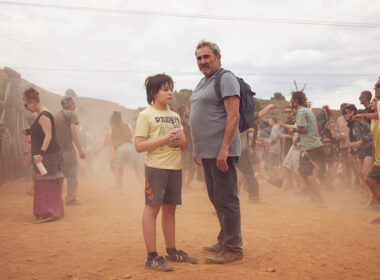Damien Chazelle’s new film starts with an elephant transported up a hill in the desert for a party at a rich man’s house. It’s an innocuous scene that quickly escalates to chaos, topped by the elephant violently defecating directly at the camera’s lens (and on top of the Mexican trying to help).
Beyond setting the tone, this prologue hints at an interesting theme: working-class people being forced to submerge themselves in a literal river of shit to suit the whim of a wealthy white hedonist. They get stopped on the way to the party by a policeman, who has to be bribed with an offer to attend the bacchanalia. Get the point? Then revel in it, because the rest of Babylon avoids exploring this issue and any other relevant philosophical thought.
Babylon is fast, lurid, and absorbing, but, like its party scenes, when the dust settles you’re left with an unpleasant taste in your mouth.
Chazelle doesn’t hold himself back when portraying the early days of Hollywood. The party takes over twenty minutes of the start of the film, and it’s an anarchic affair of light and movement, like a Baz Luhrmann show on cocaine. Chazelle shows everything. Half the extras are naked. There are people having sex in the open. Mountains of all kinds of drugs. Alcohol flowing everywhere.
It’s not just Babylon. It’s Sodom and Gomorrah. A Biblical temple of pleasure and excess, unaware of its impending doom.
The plot follows a group of different characters, their tale mainly told through the eyes of Manny Torres (Diego Calva), a young Mexican immigrant eager to make it in Hollywood. He falls for Nellie LaRoy (Margot Robbie), whose trashy yet sexy pose quickly turns her into a star in the Pre-Hayes Code era. Then there’s Jack Conrad (Brad Pitt), a mix of John Gilbert and Douglas Fairbanks, whose films are actor whose films are always an assured success. And finally, the jazzman Sidney Palmer (Jovan Adepo), whose trajectory goes from playing at the many parties in town to becoming the star in a series of MGM follies.
The problem with all those characters is that they need more depth to carry the many big themes the film tries to swing our way. It’s not the actors’ fault. Pitt and Robbie are severely miscast here, and at least they’re having fun in the midst of all the hecticness. It’s Chazelle who seem himself to be such an auteur he won’t admit that he’s a better director than a writer. It’s not surprising that his best and most nuanced film, First Man, is also the only one he didn’t write.
To hide all these shortcomings, Chazelle cuts each scene to a cool, fast beat, like a jazz song, expertly adding increasingly more elements. It’s like Scorsese’s Casino or Paul Thomas Anderson’s Boogie Nights. Every scene in the first two-thirds of the film descends into chaos until it’s resolved by a final gag. Usually someone dies, comes up with an offbeat solution, or simply escapes, with no resolution offered. This makes Babylon compelling, as it’s hard not to feel the blood pumping and get some excitement from the action.
But Chazelle is an auteur, a real one, a serious one. And auteurs usually aspire more than just titillating romps, but to reach the heights he desires here he needs to understand the implications of what he’s portraying.
It says a lot that Chazelle was inspired by Kenneth Anger’s infamous and now widely disproved book Hollywood Babylon. It says a lot that he represents Roscoe “Fatty” Arbuckle as a bumbling drunken dilettante, in tune with the smear campaign spearheaded by William Randolph Hearst against the actor. It says a lot that he misunderstands Boogie Nights, including adding a scene in the third act where our hero and a friend visit a drug dealer. It says a lot that Biblical references are blunt and inconsequential. Still, our female protagonist getting attacked by a snake? A literal descent into hell? Too much? Not for Chazelle, the auteur.
What Chazelle has failed to see is that what made Casino and Boogie Nights great was the humanity of its characters. He loves the tabloid gossip too much to try to bring some of that warmth to his characters.
And then there’s the whitewashing. Sidney is forced at some point to darken his skin. At least the Southern audiences think his band is mixed race. That’s the line he’s not willing to cross, but I doubt it was the first time he experienced racism in the industry (also, couldn’t they just move a spotlight from him?). Particularly damning when the film shows the country’s reactions to Al Johnson’s The Jazz Singer, the first talkie. What it doesn’t show is that the film in question includes a lot of blackface, but I guess that didn’t pass the vibe check.
Babylon is long. In length, yes, it’s almost 190 minutes, but honestly, its fast pace makes it work. And the pace makes it exhausting. It never stops to smell the roses, but powers incessantly through each scene. The ending is a baffling moment where a character watches Singin’ in the rain on the big screen, wide-eyed in awe, and the film . And if you missed that point, Chazelle adds a montage of shots from later blockbusters, from Jurassic Park to Avatar, which in itself misses the point of what makes the experience of cinema so unique.
At best, these problems are caused by Chazelle’s own misguided libertarian shenanigans at play. At worst, he creates them accidentally because he can’t control his impulses. In any case, I pass.
Verdict: Two out of five
For those who miss a good jolt of kinetic, if puerile, filmmaking.




